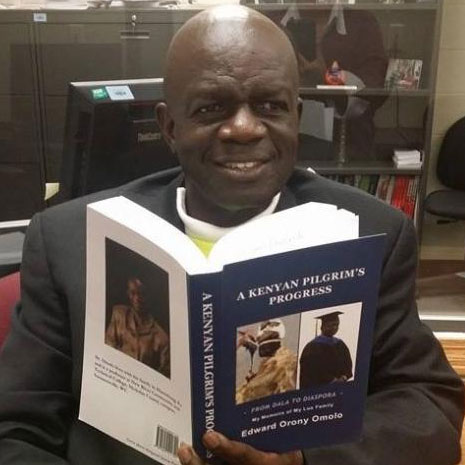 Dr Edward Orony Omolo, author of A Kenyan Pilgrim’s Progress – From Dala to Diaspora. [PHOTO: courtesy]
Dr Edward Orony Omolo, author of A Kenyan Pilgrim’s Progress – From Dala to Diaspora. [PHOTO: courtesy]
You might remember a bitter-sweet memoir once reviewed in this newspaper early this year, in which the author traumatically recalls: “I witnessed them trying to force my father’s body as a carcass into the small coffin. Defeated, they took a ‘panga’ (machete) and chopped through the femur of both his legs so that he would fit into the coffin. I felt terrible”.
The text was authored by the Kenyan-American research scientist, Dr Edward Orony Omolo, and the title was ‘Dala and Diaspora – Testament: A Luo Family Story’ (2012).
The author has finally sifted and republished the huge anthropological material, which went into making the 541-page cultural memoirs. Edward has dispensed with the distractive theorising, which characterised the first edition of the book.
Republished this month, and now titled ‘A Kenyan Pilgrim’s Progress –From Dala to Diaspora’ (2014), the interesting narrative has now been condensed into 477 pages, and it leaves the Kenyan reader with many questions regarding the history and fate of the Kenyan state.
The tale equates the author to the protagonist in John Bunyan’s allegory, The Pilgrim’s Progress (1678).
“After consultation with those who had read the previous book”, explains the author, “I discovered that many thought the history and anthropology in the narrative was too academic to let them enjoy the story. I had to spare them the agony. They felt the academic content was diluting a good story. I had to listen.”
Tough-clawed leopard
The new book concentrates on the author’s life story, and with the sad but humorous tales of his father and grandfather lurking in the background. Edward says he has also tried to build bridges between his Kenyan and American worlds.
“I have attempted to show that humanity is one, based on the cross-cultural realities I exposed myself to on coming to America,” says the scholar of Molecular Biology.
“The new book mediates the issue of culture shock, which torments many Kenyans who come to the US for the first time. For instance, I have come to learn that what the Americans call ‘Halloween’ is not very far from ‘Nyawawa’ on the shores of L Victoria, the ghosts to which some African communities attribute measles.”
The author has also included the thoughts of his six children in the last pages. These are the offspring who constitute the fourth generation in his lineage, counting from his grandfather Ong’ele Abuka, who was born in the late 19th Century.
His children’s thoughts offer an interesting window into how young Kenyans born abroad think about their fathers’ origins.
The author accepts that marriage is an unbeatable wrestler. Even our parents warn us so.
Once tormented by his troublesome wife Xanthippe, it was the Greek philosopher Socrates who advised: “You may choose to marry, or not to; but whichever you choose, you will regret it”.
The new book incorporates the musings of the person who saved the author from the tough-clawed leopard which his marriage had become. But Edward takes marital failure in his stride.
Sh500 fine
Available in the Amazon online, the book tells you that perhaps there was more humour in the colonial days than now. Consider the author’s grandfather Ong’ele Abuka, who goes to World War 1 and, on his return, takes up the role of a public wife inheritor.
In the end, he elopes with a young widow, abandons his homestead, and flees to a distant village for good. Consider also the illiterate young man who leaves his two wives at home in Rongo and travels to Kisumu where he intends to live with a cousin as he hunts for a job.
In Kisumu, the traveller cannot read the clear warning, which prohibits people to walk on the railway line. The offender is quickly arrested, charged in court, and bundled in jail because he cannot pay the Sh500 fine. His family searches in vain.
When the poor fellow returns home after two years of jail life, his two wives are the first to flee and take cover.
Talking of polygamy and wife-inheritance, find out how the two World wars benefited from these maligned African practices.
The thread of ethnicity is much more complex than we think, and the author suggests a self-reflective approach to communal empowerment. In spite of individual effort and all the social safety nets, which African tradition puts in place, Edward would not have gone to school but for the effort of an unlikely benefactor.
You should read ‘A Kenyan Pilgrim’s Progress’. It stresses conviction, individual effort, and atmosphere. It is a story of triumph away from home, and after a trail of haunting tragedies in a continent where pure honesty seems to earn you no interest in the bank of life.
This question will linger in your mind; what makes it easier to succeed abroad than at home in Africa?
 The Standard Group Plc is a multi-media organization with investments in media
platforms spanning newspaper print
operations, television, radio broadcasting, digital and online services. The
Standard Group is recognized as a
leading multi-media house in Kenya with a key influence in matters of national and
international interest.
The Standard Group Plc is a multi-media organization with investments in media
platforms spanning newspaper print
operations, television, radio broadcasting, digital and online services. The
Standard Group is recognized as a
leading multi-media house in Kenya with a key influence in matters of national and
international interest.









